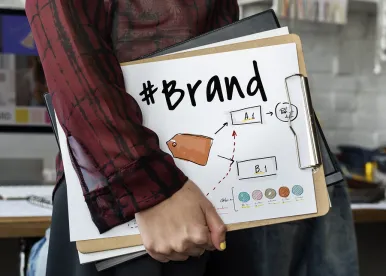Notoriously litigious, Louis Vuitton Malletier (“Louis Vuitton”) aggressively polices unauthorized use of its famous marks, logos, and protected designs, especially in the digital age when selling counterfeit goods is as easy as setting up a website.
In 2006, Louis Vuitton discovered websites indirectly selling knock-off goods while using Louis Vuitton’s copyrighted images, designs, and trademarks without permission. Upon further inquiry, Louis Vuitton discovered the websites were using IP addresses assigned to Managed Solutions Group, Inc. (“MSG”) and Akanoc Solutions, Inc. (“Akanoc”), both of which are in the “web hosting” business. MSG leased servers, bandwidth, and some IP addresses to Akanoc, which in turn, operated the servers and otherwise ran the web hosting business. Akanoc leased packages of server space, bandwidth, and IP addresses to its website customers, some of whom were located outside the United States, primarily in China. Both MSG and Akanoc are owned and managed by Steven Chen (“Chen”). Louis Vuitton sent at least 18 infringement notices and take-down demands to MSG and Akanoc identifying the trademark and copyright infringement occurring on various websites hosted by them. MSG and Akanoc, however, failed to respond to the notices or otherwise to remove the infringing content from their servers or require their customers to do so. As such, the websites continued to operate and infringe on Louis Vuitton’s intellectual property using MSG and Akanoc’s servers and IP addresses.
Louis Vuitton sued MSG, Akanoc, and Chen (the “Defendants”) for contributory trademark and copyright infringement. Arguing Defendants had actual knowledge of their website clients’ activities, ignored Louis Vuitton’s infringement notices, stuck their heads in the sand as to avoid learning the full extent of their web clients’ infringement, and continued to provide web hosting services to known infringers who used those web hosting services to sell counterfeit goods and to infringe on Louis Vuitton’s trademarks and copyrights, Louis Vuitton sought to hold Defendants jointly and severally liable for the direct infringements of their website clients.

After trial, the jury returned a verdict in favor of Louis Vuitton, holding Akanoc, MSG and Chen liable for contributory infringement of thirteen trademarks and two copyrights. The jury awarded $10,500,00 in statutory damages for willful contributory trademark infringement and $300,000 for willful contributory copyright infringement against each defendant. Defendants moved for judgment as a matter of law requesting the court set aside the jury verdict as unsupported by the evidence. The Northern District of California granted the motion as to MSG, finding there was no evidence MSG did anything more than own and lease the hardware operated by Akanoc and Chen, but denied the motion as to Akanoc and Chen. An appeal to the Ninth Circuit followed.
The Ninth Circuit affirmed the district court’s granting of MSG’s motion to set aside the jury verdict because there was no “substantial evidence” presented at trial to show MSG, which did not operate the servers that hosted the direct infringers’ websites, had reasonable means to withdraw services to the direct infringers.
The Ninth Circuit also affirmed the district court’s refusal to overturn the jury verdict as to Akanoc and Chen because the jury had sufficient facts to conclude Defendants continued to supply services to customers they knew or had reason to know were engaging in trademark and copyright infringement. See Louis Vuitton Malletier, S.A. v. Akanoc Solutions, Inc., 658 F.3d 936 (9th Cir. 2011).
To prevail on its contributory trademark infringement claims, in addition to establishing Defendants continued to supply services to those they knew or should have known were engaging in trademark infringement, because Defendants were service providers rather sellers of goods, Louis Vuitton also had to prove Defendants had “direct control and monitoring of the instrumentality used by a third party to infringe” Louis Vuitton’s marks. Even though Defendants provided legitimate web hosting services and were not involved in their customers’ infringing business, Defendants had a “master switch,” which they could and should have used to take the infringing websites offline. Therefore, because Defendants had knowledge of their website customers’ infringement (via Louis Vuitton’s notices), but failed to take reasonable action, i.e. terminating web hosting services to infringing clients, Defendants can be held contributorily liable for the direct infringements of its website clients – even if Defendants had no intent to aid or assist in the infringements. Accordingly, the Ninth Circuit affirmed the jury verdict.
Affirming the contributory copyright infringement verdicts, the Ninth Circuit held that an express finding of intent is not required for contributory copyright infringement liability. Rather, intent is implied as a result of “a service provider’s knowing failure to prevent infringing actions.” Additionally, an express finding of material contribution is not necessary since material contribution exists where a defendant’s service or activity “substantially assists” direct infringement. By providing server space to direct infringers and not shutting the websites down after receiving notice of the infringement, Defendants’ services were “an essential step in the infringement process.”
Finally, the Ninth Circuit found the jury’s statutory damage awards of $10,500,000 per defendant ($21,000,000 total) for willful contributory infringement of Louis Vuitton’s trademarks and $300,000 per defendant ($600,000 total) for willful contributory infringement of Louis Vuitton’s copyrights, violated the statutory maximums set forth in the Lanham Act, 15 U.S.C. § 1117(c)(2), and in the Copyright Act, 17 U.S.C. § 504(c). Under 17 U.S.C. § 504(c), the statutory maximum for willful copyright infringement is $150,000 “for all infringements involved in the action, with respect to any one work, for which any one infringer is liable individually, or for which any two or more infringers are liable jointly and severally.” Under 15 U.S.C. § 1117(c)(2), the statutory maximum for willful trademark infringement involving counterfeit marks at the time of trial was $1,000,000 “per counterfeit mark per type of goods or services sold, offered for sale, or distributed, as the court considers just.” The Ninth Circuit determined there was no legal basis for multiplying the damage awards by the number of defendants since, when combined, the awards ($21,000,000 for trademark infringement and $600,000 for copyright infringement) exceeded the statutory minimums ($13,000,000 for thirteen trademarks & $600,000 for two copyrights). As such, Ninth Circuit found Akanoc and Chen jointly and severally liable for $10,500,000 for contributory trademark infringement and $300,000 for contributory copyright infringement.



 />i
/>i

